The Straight and Narrow
Los Prietos Turns Young Lives Around
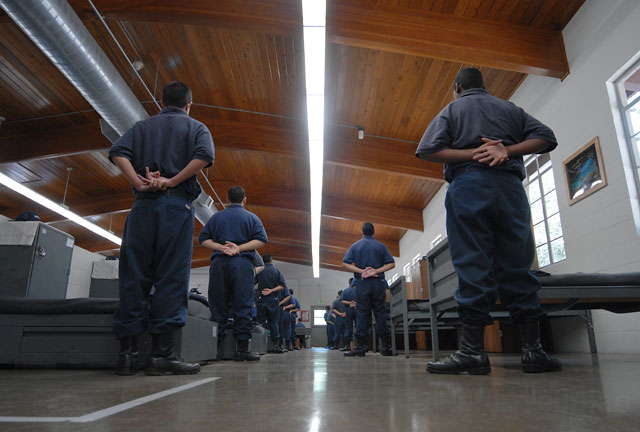
Andy Paddock was headed down a path, and it wasn’t a very straight or narrow one. The Santa Maria teen had been on probation since age 13. He was a junior in high school but only had the credits of a freshman. He fought with his mother, hung out with a rough crowd, was on house arrest, and was addicted to heroin.
It wasn’t long before the law caught up with him yet again, this time because he cut off his house-arrest bracelet. But instead of heading back to Juvenile Hall, he ended up at Los Prietos Boys Camp.
For the now–18-year-old Paddock, it was like being transported to another country. It certainly was another culture. Los Prietos operates like a boot camp, with strict curfews, work schedules, and enforced school attendance. About 80 boys live there at any time, ages ranging from 13 to 18, all dressed in the uniform of crisp collared shirts and pressed slacks — blue for the older boys, brown for the younger ones. The whole place is about structure, structure, structure. “My first month there, I was always in trouble,” Paddock remembered, “but eventually, I caught on.”
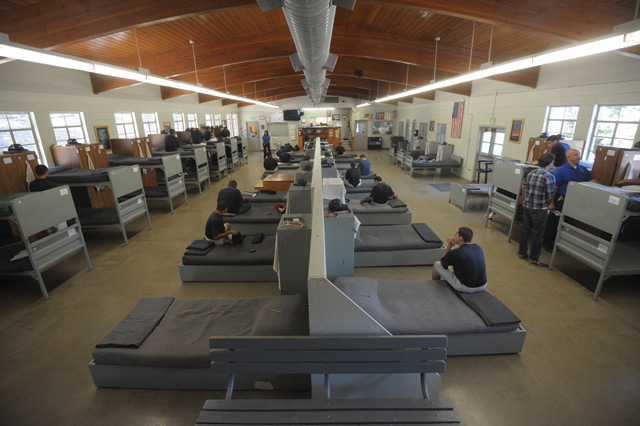
The morning I first visited Los Prietos, I went to speak at a job fair the county education office had sponsored. The boys impressed me with the sincere, respectful way they spoke, shaking my hand and addressing me formally. When they walked in the room, they removed their hats, some revealing tattoos on their young faces. But they stood up straight and looked me in the eye. They asked sharp questions about my day-to-day job, how much vacation time I got, and how much I was paid. Interesting behavior, I thought, from a group of supposed criminal bad boys.
It was a few weeks later while covering a South Coast Task Force on Gangs meeting that I became convinced this story needed to be told. A group of Los Prietos teens performed a well-choreographed play called The Drama Kings. In quick staccato and with few props, they told their life stories — how emotional pain and loneliness drove them into gangs, how drugs filled the void left by hunger, how their parents weren’t around to make them go to school.
It was a moving, impressive performance. But just as impressive was how the group handled the questions from the Task Force panel and audience members. The boys responded with maturity and respect about their hopes for the future. They sounded just like all boys their age, with a wide range of dreams. One told of how he hoped to head to City College. Another, how he planned to work as a tree trimmer. But they all pressed upon the politicians and community leaders the need for more programs like those offered at Los Prietos.
In the last few years, the County Probation Department, which runs Los Prietos, has suffered some of the most intense budget cuts of any department in the county. In 10 years, it has lost more than 100 positions — 25 percent of its personnel. But the success of the camp has impressed the Board of Supervisors enough to always provide enough funding to keep it alive.
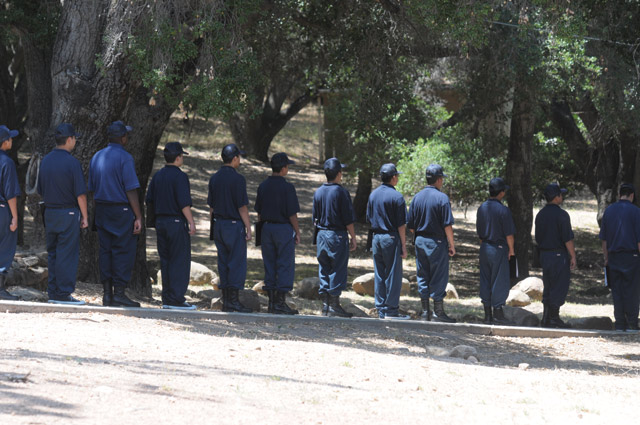
Basic Training in the Forest
To say Los Prietos is off the beaten path would be accurate. Head up Highway 154, over the hill, and down toward Santa Ynez, and after hanging a right on Paradise Road and winding five or so miles east, you’ll come upon the 17.4 acres of U.S. National Forest land that has operated as the camp since the mid 1940s. “The separate location is great for us,” explains Dean Farrah, a tall, husky man who has been the director of Los Prietos for the last two years or so. “It makes it difficult for them to walk away. And a lot of kids have not been in this environment before.”
None of the boys are here by choice. A judge has sent them to Los Prietos instead of to Juvenile Hall based in part on recommendations from the Probation Department. They’ve all committed a variety of crimes, from robbery to assault and battery, for which they are required to serve anywhere from 120- to 189-day sentences.
Between 75 and 80 percent of the boys have gang terms or conditions, and similar percentages have a history of drug or alcohol issues. Santa Barbarans make up 50 percent of the group, the rest coming from the Lompoc and Santa Maria areas. Most of them lack basic social skills. For the staff, it often means teaching 16- and 17-year-olds basic life skills: good manners, how to make a bed, and how to do homework. “These young men are looking through a different lens than you and I,” Farrah said.
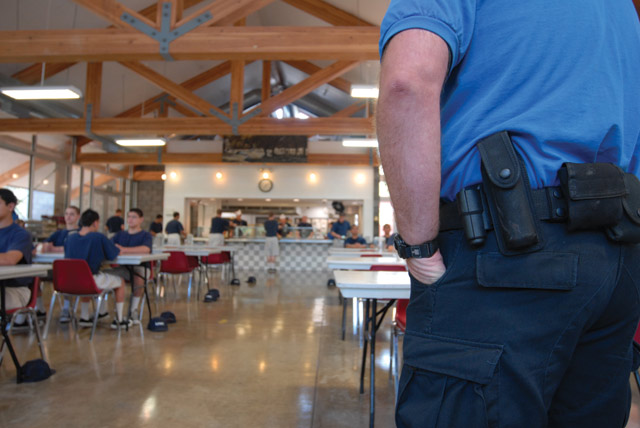
The goal of Los Prietos is this: to have the boys return to their communities — to our community — as responsible members of society, teaching them discipline, responsibility, and respect. “In our view, it’s a priceless potential to take a taxpayer liability and turn them into a taxpayer,” Farrah said.
The daily life at Los Prietos is regimented: Wake up at 6 a.m., use the latrine, then 30-40 minutes of calisthenics followed by cleanup, breakfast, and into the classroom by 8 a.m. Lunch, dinner, and the additional training and education programs all adhere to a strict schedule. Lights are out by 10 p.m. While the discipline rubs some of the boys the wrong way — after all, what teenager likes being disciplined? — many of them begin to realize why it happens. “They piss me off a lot,” said one Santa Maria teen, “but they are also helping me with my personal life.”
Inside the dorms, everything is orderly: single beds down the middle of the room, bunk beds lining the walls. The latrine is wide open, and privacy is quite limited. The dorms are air-conditioned and fitted with computers for the boys to work on school projects or résumés. Gang members are forced into close quarters with rivals. “They have to live with each other and learn to respect each other,” said Jim Clark, a 30-year vet as an officer at the camp. Ribbons and plaques are displayed on a wall, the awards boys have won at fairs and competitions.
Privilege is gained from good performance. If the group as a whole is doing well, they might be allowed to see a movie. A gym is available for recreation a good portion of the weekend. Getting gold stars for anything from behavior to a clean bunk might lessen the amount of time a boy has to spend at the camp. Getting caught with gang materials or getting into fights and other mischief might extend the amount of time. Less serious offenses can be worked off through a redemption process, while more egregious offenses can’t be. Boys with three straight weeks of good behavior can earn a fourth. They can turn a 180-day commitment into four-and-a-half months or a 120-day commitment to 90.
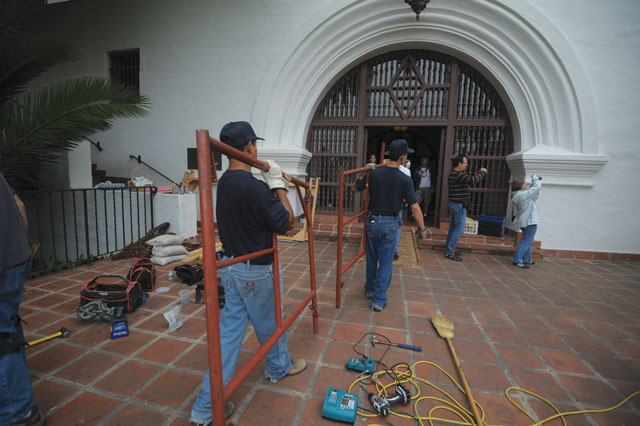
Learning to Succeed
And then there is Los Robles High School, a fully accredited school on the Los Prietos campus. Each boy is required to attend full-time, and the only option, frankly, is success. Before they start, each boy takes an assessment test to ensure he enters at the right level. Some of the boys, according to head liaison teacher Daniel Schradermeier, begin with only three or four credits. “For a lot of kids, this is the first time they’ve gone to school five days a week,” said Schradermeier, who has taught at Los Robles for 21 years. This is a serious problem, since statistics show that if a person doesn’t have a high-school education, his chances of going to prison increase eight-fold.
Los Robles is designed to make it possible for each teen to catch up with his class. Andy Paddock, for example, was missing two years of credits when he began, but by snagging extra credits whenever he could, he ended up graduating while he was still at Los Prietos. “I just hit the books and graduated high school,” he said. “It was something I thought I’d never do.”

The teachers keep them busy with reading and working on projects, give clear instructions, and set clear expectations. Teachers meet weekly with most kids, shaping the study to each individual need. In the afternoons, there is a special program for students such as Paddock who need to make up credits. At one of my visits, nine boys were enrolled in that afternoon program. Two boys were currently taking college classes online.
Since 2006-2007, Los Robles has had 171 high school graduates, averaging about 40 a year. “For some of these boys,” DA Joyce Dudley said, “it was something they did not believe they would ever be able to achieve.” Others, once they’re released, return to the high school from whence they came, all caught up on their credits. Recently, 13 young graduates of Los Robles enrolled in the fall quarters at Santa Barbara City College and Allan Hancock College, 10 of them using scholarship funds available through a program specially designed for Los Robles students. “If they go to Juvenile Hall, they just lay on their bunks,” Schradermeier said.
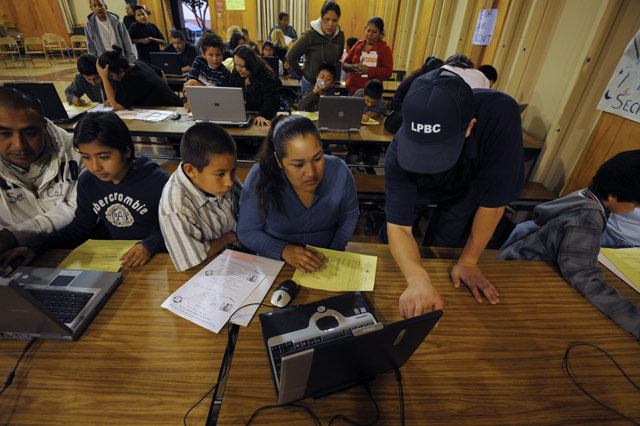
Waking Up to the World Around Them
Work and vocational training are integral elements to the program at Los Prietos. “We try to cast that wide net and get someone interested in something,” Farrah said. Los Prietos helps the boys prepare for getting jobs once they are released. They practice how to navigate job interviews and prepare their résumés, and volunteers visit the camp to work with the boys on public speaking and developing their interpersonal skills. “The goal is to use programs that meet the most needs,” said Laurie Holbrook, the supervising probation officer at Los Prietos.
At a vocational technology class, for example, the boys learn how to repair old donated computers. They are then donated to needy families through the Computers for Families program. Oftentimes, the boys get a chance to be a part of the distribution, such as last week at Harding School. The boys walked away not only knowing that they had acquired a useful skill, but also having a boost to their sense of pride in knowing that they had helped others. “At first when I did it, I just thought it was a job,” one Los Prietos boy named Jonathan explained. “But I remember seeing this one little girl jumping around, and I laughed for a bit because I thought it was pretty cool. Being in there and seeing that happen made me feel good. I didn’t realize the impact I was having.”
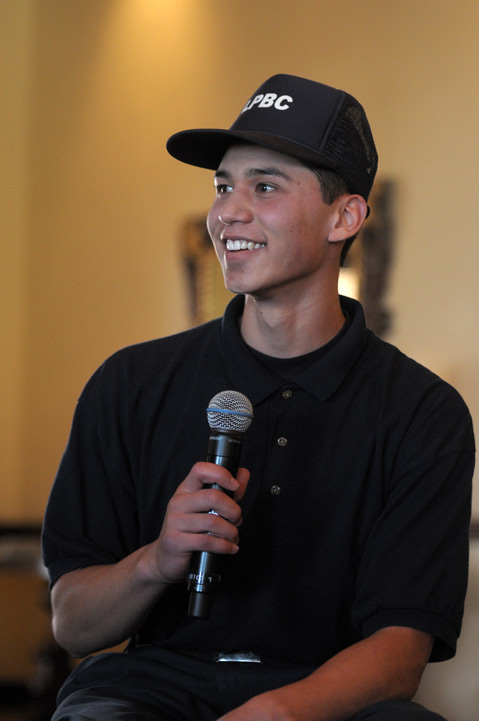
Jonathan is an 18-year-old from Santa Barbara who, when I first met him, was four months into his six-month stint at Los Prietos for committing commercial burglary. His story sounded a lot like those told in The Drama Kings. He came from a tough home, living with his mom, her boyfriend, and his two younger brothers. His mother, who is bipolar and suffered from big mood swings, never really had time for him. “It left me to do what I wanted,” he said. He started stealing, using drugs, and hanging out with the wrong crowd. He was expelled from school at the end of his sophomore year and never went back.
When Jonathan walks out of camp, he will not only have obtained the computer-fixing know-how but also learned how to cook, a skill he previously didn’t have. He started off the day I met with him making French toast and eggs and baking cupcakes for the entire camp. He also has been part of a fire-prevention work crew clearing dry brush.
In the afternoons, after school, many of the teens work on trail restoration and weed and litter abatement with the U.S. Forest Service. “We’re teaching the boys a good, strong work ethic,” Los Prietos veteran Jim Clark said. There’s a construction technology program, and many of the boys work on garden exhibits that are featured at fairs throughout the county or plant trees as part of the Goleta Valley Beautiful program. They helped construct the moving Vietnam Wall a few months back and helped with the setup and takedown of the stage for Fiesta at the county courthouse. “They’re out there earning back the respect of the community,” Clark said.
There are drug and alcohol counseling sessions and regular medical and psychological help available. And for the boys who have fathered a child, there is a teen-parenting program offered through a collaboration with the Youth Law Center and Georgetown University. Boys attend a 10-week session, learning how to play with their children, how to make eye contact with their kids, and how to form bonds. The camp allows the children to visit the camp, allowing the fathers to appreciate what a great responsibility raising a child can be. “A parent with better skills will keep the kid out of trouble,” Farrah said. These classes are in a special room equipped with toys and Sesame Street paintings. Sessions are videotaped, and according to Farrah, the first few classes have shown that while the teens may be less engaged in other programs at the camp, they are serious about this one.
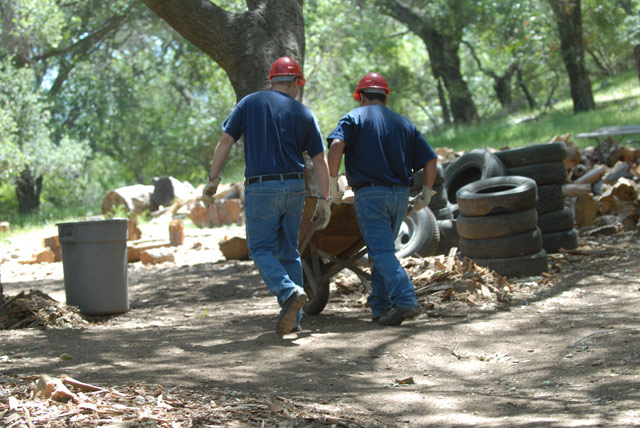
Cutting Loose
On a day that I visited the camp last summer, three young men were graduating, having completed their time at Los Prietos. It’s a daunting idea for them all. After months of stability for the first time in their lives — no drugs, no alcohol, plus three meals a day, and plenty of structure and discipline, they are now heading back into the wilderness. “I feel like I might go back to the same thing I did before,” one Santa Maria boy admitted. “I’m worried.”
At the graduating ceremony, Clark reminded the trio that they were headed back to the real world, but that they were “going to have to make the right decision.” Farrah told them, “I know you can and will be successful.” While the camp staff is strict when they need to be, it’s not the only thing that works. Sometimes a boy just needs someone who believes in him. “Too often, you hear kids believe they have no future,” Holbrook said. “Some just don’t know what’s out there.” Positive reinforcement goes a long way.
And that encouragement resonates with the boys. “They’re giving us the tools; we just have to finish the job,” Jonathan said.
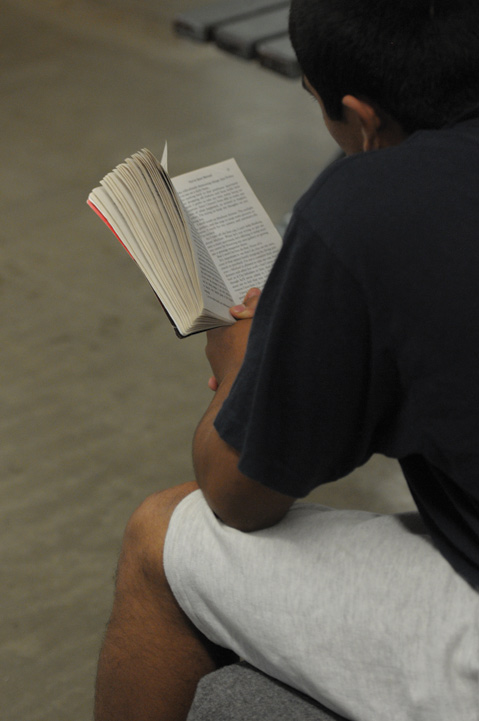
It’s hard to measure the successes and failures of the program in raw numbers, though the Probation Department does follow kids two years post-graduation. In 2009, 75 percent of the graduates from the previous two years had no new offenses. “The program and camp staff are truly committed to changing the boys’ behaviors, lifestyle, and outlook on life,” said DA Joyce Dudley, who would know, as her office has to prosecute and re-prosecute offenders. “I truly believe the camp has been integral in changing many lives for the better.”
But while the work at Los Prietos might turn the heads of onlookers, the program is about the boys — boys who will become men, like Andy Paddock, who is now 18 years old and living in Oxnard. He is engaged to be married, with a child on the way. He’s finished a semester of college and has dreams of being a juvenile institution officer. And he’s headed in the right direction, in large part because of his time at Los Prietos. “It changed my life,” he said. “Before, I was really immature and didn’t really care about anything. They helped me figure out what I wanted to do with my life, where I wanted to go, and helped me think about how to get there. They’d never say you couldn’t. I started to believe I could make my life what I wanted it to be.”



